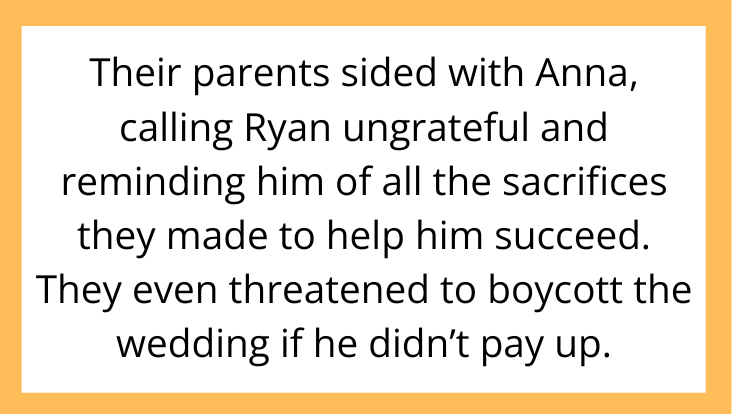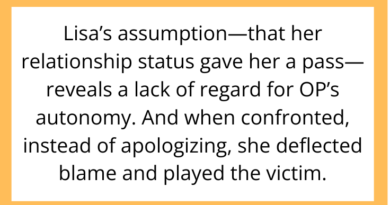AITAH for Refusing to Pay for My Sister’s Wedding Even Though I Could Easily Afford It?
When family expectations collide with personal boundaries, the fallout can be explosive. Today’s AITAH scenario comes straight from a viral Reddit thread where one sibling’s refusal to bankroll a lavish wedding turned into a full-blown family feud. Let’s unpack what really happened—and whether saying “no” makes you the villain.
The Situation: A Wedding Budget Bombshell

A 35-year-old professional—let’s call him Ryan—posted on r/AITAH to share his side of the story. Ryan has built a successful career in tech and enjoys a comfortable income. He owns his home, has a healthy savings account, and lives a relatively modest lifestyle despite his high earnings.
His younger sister, Anna, 28, recently got engaged and began planning an elaborate destination wedding. The problem? She and her fiancé didn’t have the funds to cover their dream celebration.
Anna approached Ryan with a request: she wanted him to pay for the entire wedding—estimated at nearly $60,000.
Ryan was stunned. While he loves his sister and wants her to be happy, he felt that spending that amount of money on a single event was unreasonable. He offered to contribute a more modest $5,000 as a wedding gift.
Anna did not take the news well.
The Fallout: Family Divided

Anna accused Ryan of being selfish, greedy, and unsupportive. She argued that he “wouldn’t even notice the money was gone” and that it was his duty as her only sibling to step up.
Their parents sided with Anna, calling Ryan ungrateful and reminding him of all the sacrifices they made to help him succeed. They even threatened to boycott the wedding if he didn’t pay up.
Feeling cornered and vilified, Ryan turned to Reddit: AITAH for refusing to fund my sister’s wedding when I could technically afford it?
The Case for Ryan: Boundaries and Fairness

Many commenters were quick to defend Ryan’s decision.
One top-voted reply summed it up: “Having money doesn’t obligate you to spend it however someone else wants.”
Here’s why most people agreed Ryan wasn’t in the wrong:
-
Autonomy Over Finances: Just because you can afford something doesn’t mean you should feel forced to pay.
-
Precedent Setting: If Ryan agreed this time, would he be expected to bail out family members for future big expenses?
-
Generosity Within Reason: A $5,000 gift is hardly stingy—it’s extremely generous by most standards.
The Case for Anna: Family Duty and Gratitude

Not everyone sided with Ryan. A minority of commenters felt Anna had a point:
-
Cultural Expectations: In some families, it’s customary for more financially secure relatives to help out.
-
Family Sacrifices: Anna and Ryan’s parents helped him pay for college, which kickstarted his success. To them, this was a way to “pay it forward.”
Even so, most felt Anna’s demand crossed a line from hopeful to entitled.
Money and Sibling Dynamics

Financial Disparity Breeds Resentment
It’s common for wealth gaps between siblings to create tension. Anna may feel Ryan’s success is partly thanks to family support—so she expects reciprocity.
But healthy families respect that everyone has their own financial goals and limits.
The Slippery Slope of Obligation
If Ryan gives in, he risks establishing a dynamic where any big family expense falls on him. Over time, that can damage relationships far more than a single refusal.
Could This Situation Be Resolved?

While emotions are high, this conflict doesn’t have to be permanent. Here are a few ways Ryan might approach reconciliation:
-
Reiterate Love and Support: Make clear that declining to pay doesn’t mean he doesn’t care.
-
Offer Other Help: Help with planning, logistics, or additional (smaller) financial contributions.
-
Set Clear Boundaries: Be firm that this decision is final but doesn’t reflect on his feelings toward his sister.
The Verdict: AITAH?

Most Redditors agreed:
NTA (Not the Villain).
Ryan’s offer of $5,000 was extremely generous. Anna’s demand that he fund her entire wedding—while accusing him of greed when he declined—crossed the line into entitlement.
At the end of the day, no one is obligated to finance someone else’s dreams, no matter how much money they have.



